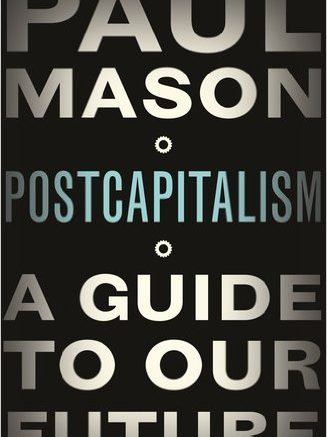Via: BoingBoing.net
Si tratta di un testo molto interessante sulla società dell’abbondanza che, per la prima volta, secondo l’autore, diventa realtà. Per la prima volta, inoltre, diventa usufruibile dall’umanità tutta. La tesi è che per il capitalismo non è possibile organizzare una realtà economica basata sull’informazione. Perciò, si pone in essere l’avverarsi di una situazione di oggettiva abbondanza.
Economist Paul Mason’s blockbuster manifesto Postcapitalism suggests that markets just can’t organize products whose major input isn’t labor or material, but information, and that means that, for the first time in history, it’s conceivable that we can have a society based on abundance.
Mason is one of those fortunate writers who can talk about complex economic subjects and still be engaging, and Postcapitalism is a grabber from page one.
Per postcapitalismo l’autore intende una fase storica in cui le leggi del capitalismo classico non sono più all’ordine del giorno, non sono più attive. Potremmo fare una similitudine (non del tutto corretta) con il concetto di postindustriale. Non corretta poiché è in Occidente ad esserci il tramonto dell’industria, ma non della stressa a livello mondiale, dove anzi riscopre inusitate rinascite e successi.
Of course, he’s got a lot to work with. Global capitalism has gone weird. Whole generations are unemployed, pension liabilities are skyrocketing, and the decades-old assurance that acting selfishly will make the world better for everyone is a hollow joke. Occupy, Gezi, Arab Spring, Hackney riots, Black Lives Matter, Ferguson, mass surveillance, Euromaidan, Corbyn, Sanders… Where is it all heading? How did we get here?
Mason constructs a careful argument, grounded in the failings and successes of Marxist theory. Specifically, he’s interested in the relationship between Marx’s Labor Theory of Value to information technology. In the Labor Theory of Value, the true value of goods is the amount of labor it requires, including the labor included in delivering that labor — the hours that went into growing the worker’s food and making her clothes and getting her to the factory. Automation produces more goods with less labor, driving the value of goods down, so industry seeks out more complex products that need more labor, and more opportunities to profit.
Il libro indaga sulla teoria del valore in Marx, anche in rapporto all’uso dell’automazione (il cossiddetto macchinismo) e sul suo rapporto con l’information technology. L’aumento della composizione organica del capitale crea una sovrabbondanza di merci, il che genera, al contempo, nell’industria, l’esigenza di trovare prodotti complessi, fatti di più lavoro (creatività intellettuale) e, quindi, di maggiori opportunità di profitto.
If you accept this — and Mason has quite a long argument about where the Labor Theory comes from and how it’s been tested and what counterarguments have been raised and so on — then it’s clear that as goods become more and more made from information, not material or labor, that their prices get very weird and hard to determine. The marginal cost of reproducing an information good — a song, a book, a movie — is zero.
That’s not to say that books and music and software cost nothing to make. There’s a bunch of fixed costs associated with their production — the labor that I put into writing my books and the labor of the farmers who feed me and the spinners who clothe me while I do (not to mention the factory workers in China who made the laptop that I type on, and the miners in Africa who extract the conflict metals in that laptop). But to arrive at the cost of any individual copy, you have to divide the fixed costs of production by the number of copies that can be made once the book is done: an infinite number of copies. Divide any number by infinity and you get zero.
Unlike machines, information doesn’t wear out from use. Software “machines” can theoretically do an infinite amount of work, in an infinite amount of places, for only the cost of electricity and computers to run on. As our goods become more and more conjured from information — as everything from jet engines to pork noodles are — they become more abundant, and the case for using markets to organize our world falls away.
So far, so good. I’ve made this argument before in fiction and essays, and even mentioned a lot of the same technological systems and phenomena as Mason cites.
Mason makes good and often brilliant arguments about the transformative effect of information technology on market capitalism. They’re important arguments, too. But often, they’re just not very informed arguments when it comes to technology.
For example, in a section on how the positive externalities from companies like Amazon and Tesco could be socialized, he suggests that user data could be “suitably anonymized” and then made public, which sounds like a plausible idea, but contains one of the most contested technical arguments in policy circles today: namely, whether there is any basis for claiming that large data sets can ever be de-identified in a way that doesn’t allow for mass-scale, automated re-identification later.
Mason likewise misses the deep divisions in the open source/free software movement, misidentifies the founder of Creative Commons, and never really comes to grips with the deep debates over the moral versus instrumental cases for free and open licenses. He cites Benkler’s Wealth of Networks, but for all his discussions about copyright, never mentions Lessig (let alone Samuelson). And though the casting of products as embodied information is at the core of his argument, he has apparently never heard of spimes, nor read Sterling’s Shaping Things.
Il libro va letto proprio perché in grado di parlare, con un linguaggio relativamente semplice di concetti complessi. Tuttavia, presenta alcuni punti deboli:
This is a book that plays to Mason’s strengths, but displays some regrettable weaknesses. It’s fine to treat software as a theory-object in which it is a machine that never wears out. Just as physicists need to descend from abstract frictionless surfaces and geometric solids and engage with the stubborn materiality of the physical world, Mason’s particular argument about infinitely reproducible machines with no marginal labor inputs needs to address the fact that code is a liability, not an asset.
Likewise, it’s great to talk about modelling economies in depth, but there is a mathematics of complex systems modelling that is engaged in lively debate about the limits of big data, and it would be nice to hear how Mason’s plan takes account of those limits, when (not if) we reach them.
Senza poi contare che ormai è dimostrato in maniera piuttosto chiara che i modelli in economia sono, di solito, fallimentari. Sarà per questo che, contrariamente alla logica occidentale, il governo cinese sperimenta ed utilizza ciò che, di volta in volta, gli serve? Al di là della coerenza che certe idee possono avere con le tesi scritte o universalmente accettate, o con una sorta di ontologia della teoria, o di una primazia…del libro? Da noi, infatti i modelli precedono dall’esperienza diretta e sono il punto di riferimento. In Cina no, è tutto il contrario.
Ma se Piketty ha fallito nel distacco da Marx, Mason stà troppo appresso a Marx…..
Thomas Piketty’s Capital in the 21st Century failed to come to grips with Marx. Mason’s Postcapitalism spends too much time on Marx, and not enough on networks. But both books are indispensible reads, with important things to say.
PostCapitalism: A Guide To Our Future [Paul Mason/FSG]


Be the first to comment on "L’importanza dell’informazione e dell’immateriale nel (post)capitalismo contemporaneo."